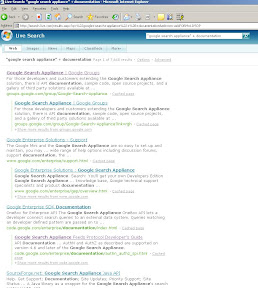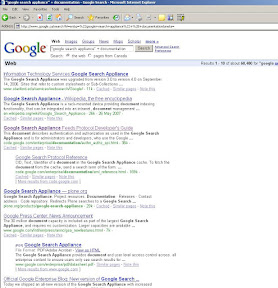In 2006 over $61 billion dollars were spent on US Television advertising. In comparison, in 2006 the
IAB estimates $16.8 billion aggregate dollars were spent on Internet Advertising. That 16.8 billion is only 5% of all advertising dollars spent per year. That $16.8 billion is an aggregate figure, but even so, is only 27% of what advertisers spent in television advertising in the US in 2006.
Aside from search, a vast amount of Google's advertising revenue comes on the back of some very non traditional ad streams. They have basically created a $10 billion dollar fabric that runs through-out the internet (Ad Words / Ad Sense) letting the little guys make money off their sites. But, much of their ad revenue is not a product of the real world's demand, but rather, is a product of the ad industry they have spawned on the net.
Magazines are the big ROI winner for advertising in general. They beat out broadcast television, which is influenced by the law of diminishing returns. They beat out newspapers which are discarded immediately after reading. But the net may slowly be creeping into their territory when it comes to ROI – especially increasing the ROI of video advertising – and potentially unlocking billions more dollars of ad revenue to the IPTV / Internet video markets.
Why? Magazines target efficiently: With a range of titles that appeal to a wide variety of demographics, lifestyles and interests, advertisers can hone in on targets that fit their needs. Magazines provide reach to the most desirable consumers: Across almost every demographic, the top 25 magazines out deliver the top 25 TV shows. In addition, heavy magazine readers are likely to be among the largest spenders across most product categories. Magazine audiences accumulate faster than you think— and with lasting impact: The average magazine accumulates approximately 60% of its audience within a month’s time. In addition, consumers refer to magazines multiple times, even saving them, giving advertisers the opportunity for added exposure.
Dynamic Logic discovered that when comparing magazines, the Internet and TV, magazine advertising was the most powerful medium in increasing purchase intent. Magazines, in a media mix that included online and TV, contributed 64% of the total increase in purchase intent (7.2% of a total 11.1% shift).
So back to the $61 Billion dollar advertising question. What if we, as internet pioneers, can take this Magazine model and apply it to internet television:
1) Magazines target efficiently / Magazine advertising engages: the internet can target niche markets by tracking your usage patterns, then during an IPTV broadcast, advertisers can serve different video ads depending on the users preference and hit that same narrow niche market – not to mention custom video feeds for every viewer, not to mention being able to skip stuff you're not interested in (just like turning the page of a Magazine).
2) Magazine advertising moves readers to action: the internet can link IPTV ads to digital marketing programs, incorporating TV on demand features such that users could explore the advertisers web site (or digital magazine), even make a purchase, and then resume viewing of their IPTV program. It cannot get any better than the net for promoting ad action.
3) Magazines provide reach to the most desirable consumers: the internet provides reach to a very general audience, with the ability to target advertisements to the specific wants of customers; thereby reaching all consumers including the desirable / influential ones in a targeted manner.
4) Magazine audiences accumulate faster than you think — and with lasting impact: the same can be said about the internet, social communities, internet viral marketing. Remember the bride that cut all her hair off – that could be your commercial – and YouTube could have been your “marketing program”. In a couple years, that same funny video will make it's rounds again - you just wait.
5) Magazines supply credibility: with social functions being built into IPTV sites such as NetFlix.com and Joost, user communities rate content – thereby creating the equivalent type of credibility – and even supplementary / complementary cross promotion VIA the community / network effect.
As Bill Gates noted in his 2007 CES Keynote: "We've talked about this as the decade of digital lifestyle, the decade of digital workstyle. It's not just one application that makes it happen. It's the fact that as you adopt these things, they really go together. […] It only catches up to us in the way it changes the way entertainment gets done. TV where we pick the news segments we want. We find the video that wouldn't have been available in a broadcast system. […] TV is a big activity and one where we see software really surprising people with what it can do. ... An individualized video stream ... ads can be target to you ... something that you won't want to skip over. As you get into a news show, the subjects you care about, you can get more info, and skip over others. You might have a ski resort you want to see every time you want to sit down to watch the nightly news whenever you want. […] It completely blows open the limitations that channels used to create. It becomes something easy for you to navigate and find. Not one TV here, and your Internet TV there. Personalization, choice, all these things that weren't possible. Last year we had very successful trials .. AT&T and Verizon are rolling out commercial deployments. This year these will scale up to really large numbers, and people will see it blows away the previous video platform. […] As that video comes into the home it will be viewable on ... every screen in the house.”
There is a huge amount of TV ad revenue that isn’t being spent on the internet. The proportion of ad budgets targeting this medium dwarfs the entire internet advertising ad budget by nearly four times. It only makes sense that as we start to realize the benefits of video distribution over the internet, that some of these traditional broadcast TV advertising dollars will start to be spent on the internet.
Which means, if Google (making $10 Billion in 2006) had made the right moves in internet video, they would have seen substantial revenue grown VIA positive media partnerships. Rather, they face a media backlash. From the magazine ad market - to the video ad market: Companies do not want to work with them because of YouTube / monopoly fears. In fact, it is because of Google’s success, that Microsoft can do certain things without huge antitrust backlash – I mean, has Microsoft lost share in any of their core business markets? They sure kicked Sony’s ass in console’s in North America. Sure they missed out on the Internet concepts – but late adopters don’t face the same challenges as early adopters - the road is somewhat paved already.
What makes me really scared is the fact that Microsoft is in talks with Yahoo! who has been scooping up huge contracts with traditional broadcasters / networks to use their internet ad platform (as these huge media empires rally against Google / YouTube). If this acquisition moves forward, Microsoft will have an enormous advantage in that they control the corporate media ad platform of choice (Panama), and are able to back any ad program with a distribution platform Windows Server + Microsoft Silverlight. And this will truly spur the innovation they need to make Gate’s vision a reality.
I’m sure Microsoft would try to keep media sources distributed over the public internet such that they can sell more Windows licenses / run more advertising programs on other peoples dollar, and promote net neutrality – all the while making huge percentages off the Panama platform. But I would expect these video sources to be consolidated and delivered VIA their private xBox Live network, to your HDTV, without the need for a personal computer (and possibly ad sponsored), to a world audience.
Additionally you can’t discount Microsoft’s history of partnering with device manufactures over the closed shop model of Apple. This may allow device platforms to integrate directly into a Microsoft Live TV platform (think Silverlight + Panama + Device Integration), in a manner that promotes rapid network /content growth (especially if it starts being delivered through xBox Live & LCD HDTV’s are discounted if you sign a Windows Live TV contract for 3 years).
In other news, the most recent complaint against YouTube came on Monday when NBC joined Viacom in their billion dollar suit against YouTube. This followed Friday’s news, when England's most prestigious soccer league and an independent music publisher filed a class action suit against YouTube.
I guess people were right when they said YouTube was a copyright nightmare - not an advertising opportunity – and it looks like Google is now paying the strategy tax.
Over and Out





